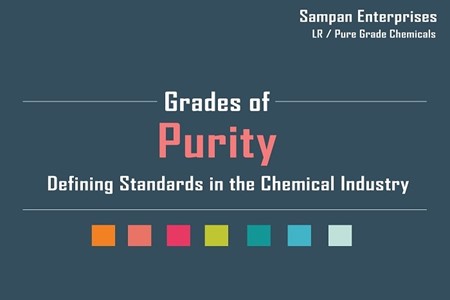
Quality of product is one of the most important factors in the Chemical Industry. A vast range of quality of Chemicals is available in the market. Chemicals are divided into various categories depending upon their purity.
What defines Purity in the Chemical Industry? Standards have been set by the industry for maximum impurities allowed in the finished product. Levels of impurities are measured in parts per million (ppm). According to the levels of impurities, some of the Grades of Chemicals are defined as follows:
1. ACS Grade: A chemical grade of highest purity which equals or surpasses the purity standards set by the American Chemical Society (ACS).
2. LR Grade: Also known as Laboratory Reagent Grade is of high purity & generally equal to A.C.S. grade. LR Grade Chemicals are suitable for use in many laboratory and analytical applications.
3. EP or EXTRA PURE: Products suitable for qualitative and semi- quantitative work.
4. Technical Grade: Purity standards defined in Technical Grade are the lowest. This chemical grade is used for commercial and industrial purposes.
We at Sampan Enterprises are dedicated to the manufacture of chemicals with the highest purity standards. All Fine Chemicals manufactured by Sampan Enterprises are of LR Grade standards and even pass Food Grade as well as Pharma specifications. The LR Grade or Pure Grade specifications of the Fine Chemicals manufactured by Sampan Enterprises are available for download below.
|
Ammonium Acetate
LR Grade / Pure Grade
|
Ammonium Oxalate
LR Grade / Pure Grade
|
Sodium Oxalate
LR Grade / Pure Grade
|
|
Mono Ammonium Phosphate
LR Grade / Pure Grade
|
Di Ammonium Phosphate
LR Grade / Pure Grade
|
Oxalic Acid |
|
Metachelate
(Chelating Agent)
Di Sodium EDTA Substitute
|